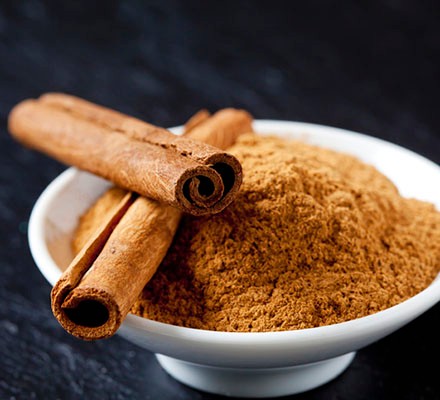Cinnamon has been a key part of traditional remedies for thousands of years. Now, science is backing up its health benefits, especially for women. It’s full of antioxidants and compounds that can help control blood sugar, fight heart disease, and lessen inflammation. These are all important for women’s health.
This article will look at how cinnamon benefits for females. We’ll see how it can improve female health benefits of cinnamon. It can help with cinnamon and menstrual cycle issues and might even help with cinnamon for PCOS and cinnamon and fertility. We’ll also talk about the cinnamon antioxidants for women that protect against chronic diseases.
Key Takeaways
- Cinnamon is a powerful antioxidant that fights inflammation and oxidative stress in women’s bodies.
- It can help manage blood sugar levels and improve insulin sensitivity, which is good for PCOS.
- Cinnamon has compounds that support uterine health and can ease menstrual cramps.
- It has antimicrobial properties that fight off bacterial infections, including acne-causing ones.
- Cinnamon may also protect the brain and keep cognitive function sharp as women age.
What Makes Cinnamon a Superfood?
Nutritional Profile and Active Compounds
Cinnamon comes from the inner bark of Cinnamomum trees. It’s known for its health benefits. It’s packed with essential nutrients and active compounds that make it a superfood.
Cinnamon’s main compound is cinnamaldehyde. This is what gives it its unique smell and taste. Cinnamaldehyde is key to cinnamon’s health benefits, like fighting inflammation, bacteria, and oxidation.
Cinnamon is full of powerful antioxidants, like polyphenols. These protect the body from damage. A tablespoon of ground cinnamon is rich in fiber, calcium, and minerals, making it a nutritional powerhouse.
Studies show that eating cinnamon regularly can improve health in many ways. It helps with metabolism, heart health, brain function, and even cancer prevention. Its mix of compounds and nutrients makes it an amazing superfood.
“Cinnamon is a spice that not only adds flavor to our dishes but also provides a wealth of health benefits. Its potent antioxidants and active compounds make it a true superfood, with the potential to support overall well-being.”
Cinnamon’s Anti-Inflammatory Properties
Inflammation is a natural body response, but too much can cause health issues. Luckily, cinnamon is a spice with strong anti-inflammatory effects. It has antioxidants like polyphenols that can lower inflammation markers, such as C-reactive protein, which is linked to disease risk.
Studies show that cinnamon’s anti-inflammatory compounds can reduce body inflammation. For example, a 2011 study found that eating cinnamon increased antioxidant activity by 13%. It also lowered insulin response by 21% and triglycerides by 31% after high-fat meals. In 2015, cinnamon was found to help treat infected wounds, showing its healing potential.
The cinnamon antioxidants also protect the brain, making it a great ally against brain disorders. Cinnemaldehyde, a cinnamon compound, lowered blood pressure in animal tests. This shows cinnamon’s broad health benefits when added to meals.
Research is clear: cinnamon is great for fighting chronic inflammation. Using cinnamon can help improve health and well-being by reducing inflammation.
Cinnamon Benefits for Females
Cinnamon is a spice that can help women’s health in many ways. It can make the menstrual cycle regular and ease symptoms of polycystic ovary syndrome (PCOS). This spice is known for its support of women’s health issues.
Menstrual Health: Cinnamon is often used to ease menstrual cramps and make the cycle regular. Its anti-inflammatory effects may lessen the pain and discomfort of menstruation.
PCOS Management: Cinnamon can make insulin work better and lower blood sugar levels. This is great for women with PCOS, who often have hormonal and metabolic issues.
Fertility Support: Cinnamon can balance hormones and improve insulin sensitivity, helping women with fertility issues. Its antioxidants and anti-inflammatory effects also boost reproductive health.
| Cinnamon Benefit | Potential Impact |
|---|---|
| Regulates Menstrual Cycle | Alleviates cramps and discomfort associated with menstruation |
| Improves PCOS Symptoms | Helps manage hormonal imbalances and metabolic irregularities |
| Supports Fertility | Balances hormones and enhances insulin sensitivity |
Adding cinnamon to your diet or supplements can be a natural way to support women’s health. Always talk to a healthcare professional before making any changes to your diet.
“Cinnamon’s anti-inflammatory properties may help reduce the risk of certain female-specific health conditions.”
Cinnamon for Metabolic Health
Cinnamon is a spice known for helping with metabolic health. Studies show it can help control blood sugar and make insulin work better. This is key for managing type 2 diabetes and polycystic ovary syndrome (PCOS).
Balancing Blood Sugar and Boosting Insulin Sensitivity
Cinnamon’s compounds like cinnamaldehyde slow down how fast carbs break down in the gut. This means less glucose gets into the blood, keeping blood sugar stable. It also makes insulin work better, which helps control blood sugar levels.
Eating 1-6 grams of cinnamon a day can improve blood sugar and insulin sensitivity. In one study, women taking 1500 mg of cinnamon a day had lower blood glucose, insulin, and insulin resistance. Women with PCOS who ate 1.5 grams of cinnamon daily had more regular periods than those who didn’t.
Adding cinnamon to your day can be easy. Just sprinkle it on oatmeal, yogurt, or smoothies. Or, enjoy a warm cinnamon tea or add it to your coffee for a tasty boost.
“Cinnamon has been extensively studied for its ability to improve metabolic health, particularly in the areas of blood sugar regulation and insulin sensitivity.”
Using cinnamon can be a natural way to improve your metabolic health. It supports your overall health and well-being.
Cinnamon and Heart Health
Cinnamon is more than just a spice that makes food taste good. It’s also great for our health, especially our heart. Studies show that cinnamon can help lower the risk of heart disease.
One key benefit of cinnamon is that it can lower cholesterol levels. Eating at least 1.5 grams of cinnamon daily can cut down on total cholesterol, LDL (bad) cholesterol, and triglycerides. This is good news for those worried about heart health.
Cinnamon also helps lower blood pressure when eaten for more than 8 weeks. High blood pressure is a big risk for heart disease. Adding cinnamon to your meals could help keep your blood pressure in check.
| Cinnamon Benefit | Impact |
|---|---|
| Cholesterol Reduction | Lowers total cholesterol, LDL (bad) cholesterol, and triglycerides |
| Blood Pressure Lowering | Reduces high blood pressure when consumed consistently for 8 weeks or more |
Cinnamon does more than just lower cholesterol and blood pressure. It can also reduce the risk of heart disease. This is thanks to its anti-inflammatory properties and how it helps your body use insulin better. Both are key for a healthy heart.
“Consuming cinnamon regularly can be a simple yet effective way to support your heart health and reduce your risk of heart disease.”
Adding cinnamon to your daily meals is a smart move for your heart. You can sprinkle it on your oatmeal, in your coffee, or use it in baking. It’s tasty and good for you.
Cinnamon’s Antimicrobial Properties
Cinnamon is a spice known for its warm, sweet smell. It’s also famous for its health benefits. The compound cinnamaldehyde in cinnamon has strong antimicrobial properties.
Test-tube studies show that cinnamon oil and extracts can stop many bacteria and fungi from growing. This includes Listeria and Salmonella, and some fungi that cause infections. Cinnamon might help prevent tooth decay and bad breath too.
Cinnamon water, made by soaking cinnamon sticks in water, is also powerful against bacteria and fungi. It could be a safe and effective alternative to regular antibiotics. This is good news as we worry about antibiotic resistance.
Cinnamon is great at fighting many pathogenic microorganisms. It can help with respiratory infections, skin infections, and food-borne illnesses. So, cinnamon is a key natural remedy for staying healthy.
Scientists are still learning about cinnamon’s boundless potential. Its antimicrobial effects are becoming more important in natural medicine and personal care. Cinnamon is a strong natural alternative for anyone wanting to improve their health and well-being.
Cinnamon and Cancer Prevention
Cinnamon is being studied for its role in preventing and treating cancer. Many studies in test tubes and animals show that cinnamon can stop cancer cells from growing. It can also stop new blood vessels from forming in tumors and even kill cancer cells.
A study in BMC Cancer from 2010 found that cinnamon extract can kill tumor cells. It does this by blocking NFκB and AP1, which are important for cancer cell growth and survival. Another study in Frontiers in Pharmacology from 2022 showed that cinnamaldehyde can target several cellular pathways to fight cancer.
Even though these results look good, we need more research to understand cinnamon’s effects on humans. Clinical trials are happening, as seen on ClinicalTrials.gov, to study cinnamon extract in cancer treatment.
A review in Nutrients from 2021 talked about how natural compounds like cinnamon could help treat cancer. A study in Frontiers in Pharmacology from 2020 found that cinnamaldehyde can target and treat breast cancer.
Cinnamon’s strong antioxidants and its effects on blood vessel formation and the immune system make it a promising natural tool against cancer. As research goes on, we might see more ways cinnamon can help prevent and treat cancer.
Cinnamon for Skin and Hair Health
Cinnamon is not just for cooking; it’s great for your skin and hair too. It has antioxidants that protect the skin from damage and help fight aging signs. Cinnamon also boosts collagen production, keeping skin elastic and firm.
It can help with acne by fighting bacteria that cause breakouts. This makes your skin look healthier. For your hair, cinnamon’s nutrients support growth and make it shiny.
Cinnamon’s Anti-Aging and Nourishing Properties
A 2019 review linked cinnamon to hair growth, thanks to its procyanidin content. A 2018 study on rats showed cinnamon oil worked as well as Rogaine in making hair longer.
Cinnamon’s main part, cinnamaldehyde, helps blood flow to hair roots, aiding growth. It also fights fungal infections, like dandruff, as a 2013 study found.
But, be careful with cinnamon. Too much can irritate your skin, cause redness, and even burns. Always test it on a small area first to avoid problems.
“Cinnamon was one of the most prized and expensive items in ancient Egypt, valued more than gold.”
Cinnamon and Neurological Health
Cinnamon, a spice known for its warm, sweet taste, might help support brain health. Studies show it could be good for cinnamon alzheimer’s and cinnamon parkinson’s.
Studies on animals found that cinnamon can stop a protein linked to Alzheimer’s disease from building up. It also protects neurons and helps with neurotransmitters and motor skills in Parkinson’s disease models. This means cinnamon might have strong cinnamon neuroprotective effects.
“Cinnamon’s ability to modulate key pathways involved in neurodegenerative diseases is a promising area of research,” says Dr. Sarah Brewer, a leading nutrition expert. “However, more human studies are needed to confirm these findings and understand the exact mechanisms by which cinnamon may benefit neurological health.”
Even though most studies are on animals, cinnamon could help with brain function and health. As research grows, cinnamon might become a key ally against serious brain diseases.
Conclusion
Cinnamon is a versatile and nutritious spice that offers many health benefits, especially for women. It has anti-inflammatory and antioxidant properties. These help support metabolic and heart health. Cinnamon is truly a superfood that can improve women’s overall wellness.
Studies show that cinnamon can lower cholesterol, reduce inflammation, and control blood sugar. It’s a great addition to a healthy lifestyle. Cinnamon also helps with menstrual pain and heavy bleeding. It supports fertility and libido in men too. With its great nutritional profile and active compounds, cinnamon is a true superfood for women’s health.
Always talk to a healthcare professional before adding new supplements or changing your diet, especially if you have health issues. Adding cinnamon to your daily routine in moderation can bring many health benefits. It’s a step towards a healthier, more vibrant life.
FAQ
What are the health benefits of cinnamon for females?
Cinnamon is great for women’s health. It helps with menstrual cycles, eases cramps, and supports fertility. It also balances hormones.
How does cinnamon help with inflammatory conditions?
Cinnamon is full of antioxidants like polyphenols. These fight inflammation. Studies show it lowers inflammatory markers, reducing disease risk.
Can cinnamon help manage blood sugar and insulin sensitivity?
Yes, cinnamon is good for metabolic health. Eating 1-6 grams of cinnamon daily lowers blood sugar and boosts insulin sensitivity. This is key for managing type 2 diabetes and PCOS.
What are the cardiovascular benefits of cinnamon?
Studies reveal cinnamon’s heart benefits. Eating 1.5 grams of cinnamon daily improves cholesterol, triglycerides, and blood pressure. These are key heart disease risk factors.
Does cinnamon have antimicrobial properties?
Yes, cinnamon’s cinnamaldehyde fights bacteria and fungi. This can prevent tooth decay, reduce bad breath, and fight infections.
Can cinnamon help prevent or treat certain types of cancer?
Studies in test tubes and animals show cinnamon can stop cancer cell growth. It can also cut off tumor blood supply and kill cancer cells. Human studies are needed to confirm these findings.
How does cinnamon benefit the skin and hair?
Cinnamon protects the skin from damage and boosts collagen production. This keeps skin elastic and firm. It also fights acne-causing bacteria for better skin health. For hair, cinnamon helps with growth and shine.
Can cinnamon have benefits for neurological health?
Research hints that cinnamon may help with neurodegenerative diseases like Alzheimer’s and Parkinson’s. It could stop harmful protein buildup, protect neurons, and balance neurotransmitters. But, more human studies are needed.
Source Links
- https://www.webmd.com/diet/supplement-guide-cinnamon
- https://pharmeasy.in/blog/10-incredible-health-benefits-of-cinnamon/
- https://www.healthline.com/nutrition/cinnamon-tea-benefits
- https://www.healthline.com/nutrition/10-proven-benefits-of-cinnamon
- https://www.bbcgoodfood.com/howto/guide/health-benefits-cinnamon
- https://www.medicalnewstoday.com/articles/266069
- https://www.ncbi.nlm.nih.gov/pmc/articles/PMC4003790/
- https://www.india.com/health/cinnamon-for-women-5-reasons-why-this-spice-is-important-addition-in-regular-diet-6770236/
- https://www.medicalnewstoday.com/articles/318382
- https://www.asmitaorganicfarm.com/blog-aof/cinnamon-in-tea-benefits/
- https://timesofindia.indiatimes.com/life-style/food-news/8-smart-ways-to-include-cinnamon-in-your-diet-for-effective-weight-loss/articleshow/107264675.cms
- https://pcosweightloss.org/cinnamon-for-pcos/












